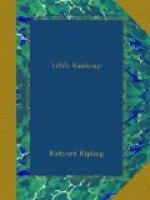’See that beggar? . . . Got ‘im.’
Seven hundred yards away, and a full two hundred down the hillside, the deserter of the Aurangabadis pitched forward, rolled down a red rock, and lay very still, with his face in a clump of blue gentians, while a big raven flapped out of the pine wood to make investigation.
‘That’s a clean shot, little man,’ said Mulvaney.
Learoyd thoughtfully watched the smoke clear away.
‘Happen there was a lass tewed up wi’ him, too,’ said he.
Ortheris did not reply. He was staring across the valley, with the smile of the artist who looks on the completed work.
THE MAN WHO WAS
The Earth gave up her dead that tide,
Into our camp
he came,
And said his say, and went his way,
And left our hearts
aflame.
Keep tally—on the gun-butt score
The vengeance
we must take,
When God shall bring full reckoning,
For our dead comrade’s
sake.
Ballad.
Let it be clearly understood that the Russian is a delightful person till he tucks in his shirt. As an Oriental he is charming. It is only when he insists upon being treated as the most easterly of western peoples instead of the most westerly of easterns that he becomes a racial anomaly extremely difficult to handle. The host never knows which side of his nature is going to turn up next.
Dirkovitch was a Russian—a Russian of the Russians—who appeared to get his bread by serving the Czar as an officer in a Cossack regiment, and corresponding for a Russian newspaper with a name that was never twice alike. He was a handsome young Oriental, fond of wandering through unexplored portions of the earth, and he arrived in India from nowhere in particular. At least no living man could ascertain whether it was by way of Balkh, Badakshan, Chitral, Beluchistan, or Nepaul, or anywhere else. The Indian Government, being in an unusually affable mood, gave orders that he was to be civilly treated and shown everything that was to be seen. So he drifted, talking bad English and worse French, from one city to another, till he foregathered with Her Majesty’s White Hussars in the city of Peshawur, which stands at the mouth of that narrow swordcut in the hills that men call the Khyber Pass. He was undoubtedly an officer, and he was decorated after the manner of the Russians with little enamelled crosses, and he could talk, and (though this has nothing to do with his merits) he had been given up as a hopeless task, or cask, by the Black Tyrone, who individually and collectively, with hot whisky and honey, mulled brandy, and mixed spirits of every kind, had striven in all hospitality to make him drunk. And when the Black Tyrone, who are exclusively Irish, fail to disturb the peace of head of a foreigner—that foreigner is certain to be a superior man.
The White Hussars were as conscientious in choosing their wine as in charging the enemy. All that they possessed, including some wondrous brandy, was placed at the absolute disposition of Dirkovitch, and he enjoyed himself hugely—even more than among the Black Tyrones.




